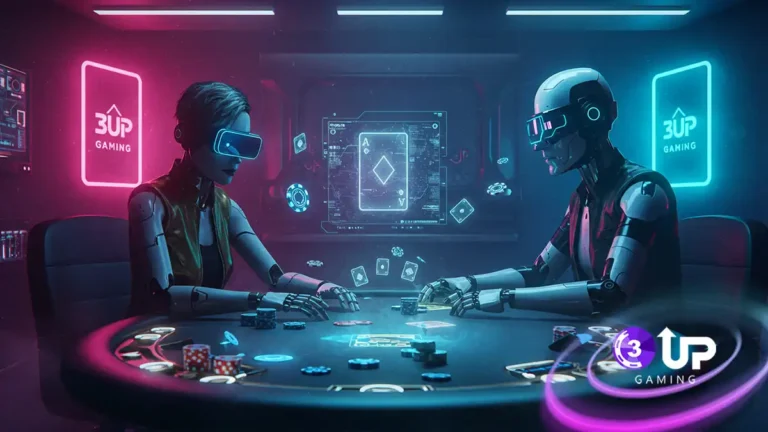How Bots Are Changing the Game of Online Poker? Online poker has undergone a major shift with the rise of bots and artificial intelligence. These automated programs are capable of analyzing gameplay, making strategic decisions, and even adapting to opponents over time.
While some poker bots are used for research and training, others have raised concerns due to their ability to gain an unfair advantage in real-money games. As online poker continues to grow in popularity, the presence of AI-driven bots is changing the dynamics of competition, forcing platforms to develop stronger detection systems and fair-play policies.
The impact of poker bots on the online gaming industry is both innovative and disruptive. Advanced bots can simulate human-like behavior, making them difficult to detect and challenging for casual players. This evolution is prompting online poker sites to invest heavily in anti-bot technology and player verification systems.
At the same time, discussions around ethics, fairness, and regulation are gaining traction. Whether seen as a threat or a tool, poker bots are undeniably transforming the way online poker is played, and the way platforms prepare for the future of competitive digital gaming.
How Bots Are Changing the Game of Online Poker!
The Rise of Poker Bots in Online Gaming
Poker is more than merely a game of cards; it’s a digital arena. With the dawn of artificial intelligence, what poker bots can do is set an all new kind of threat against the online poker rooms.
These aren’t the lame scripts from back in the 2000s though. Just as the bots learn, play and navigate in an environment the actual player would, meaning improved machines to beat even those professionals that are best.
In this post we will detail the history of poker bots development, their current impact on the game, and what the future could be for fair play on the online poker scene.
Early Days
Poker bots were introduced in the early 2000s and became a decent source of income as very simple automated rule based systems began appearing on the online poker rooms.
The first generation of such bots relied on simple algorithms to play basic straights, aggressive when holding a strong hand and tight when not and were not hard to beat.
They were not so nuanced and were slow to adjust when the tables changed. Bots started off as novelty, rather than something to worry about, to the industry and player base. But like technology, the bots also evolved.
Current State
Most modern poker bots, by contrast, use a form of artificial intelligence that is more machine learning and probabilistic modelling combined.
Some are designed to emulate human play, webbing strategies, toying with bet sizes erratically, even acting with humanlike deliberate delay to obfuscate detection.
Others are trained on hand history databases and powerful solvers and can generate optimal moves in near real time. The use of solvers which examine millions of scenarios has allowed bot makers to replicate “game theory optimal” (GTO) methods.
This has brought bot performance to a level where even experienced human players can be beat. So bots have gone from amateur experiments to professional grade threats and some are even being rented or sold on the black market.
This has sparked considerable alarm among the poker community. What was once a fringe curiosity has evolved into a real danger to the fairness and integrity of online poker games, prompting platforms to spend substantially in anti-bot technology.
How Advanced AI Is Reshaping Poker Strategy

AI in Decision Making
Artificial intelligence has redefined strategic dynamics in poker, going beyond static patterns to embrace the philosophy of fluid, data-driven decision-making. Poker AIs such as Libratus and Pluribus validate the notion that machines can analyze millions of game scenarios, analyze how the game evolves, and change strategies accordingly.
They are not programmed with a fixed set of rules; rather, they adapt to the particularities of an opponent, the table situation, or statistical probabilities. What distinguishes AI from a mere player is its ability to perform in a Game Theory Optimal (GTO) way, a mathematically balanced strategy so as to reduce its exploitability.
Human players may wreck through tilt or they could follow emotional cues, whereas the AI keeps its calm and calculates the EV (expected value) of every action with clinical precision. In this way, bots can guarantee long-term profits while sidestepping common psychological pitfalls.
These powers have ceased to be confined to high-end research projects, with a plethora of commercial poker bots now adjourning simplified versions of these AI strategies so that the user can obtain a win that might have been considered impossible to achieve with mere human effort.
Learning from Human Play
Not just from math is AI an educator – it learns from humans. The modern AI learns how to copy human tendency by analyzing millions of hand histories and behavioral patterns; then it can spot exploitable tendencies and even switch to a new playing style in the middle of a game. It learns through reinforcement learning, where the AI performs certain actions and changes them according to the results, thus continuously evolving.
Find your time with: Best Free Multiplayer Poker Apps to Play With Friends
Easy road that you build? Buy User-Friendly Poker Software
Types of Bots Used in Online Poker Rooms
But the bots have grown, too, in sophistication and ambition as online poker becomes more competitive. These automatic systems come in simple scripts to Artificial Intelligence driven ones. So, how do you know what a poker bot and its purpose is?
Here is a breakdown on the 3 major poker bots types, how they work, their abilities and limitations and where they could be playing.
Scroll down to compare:
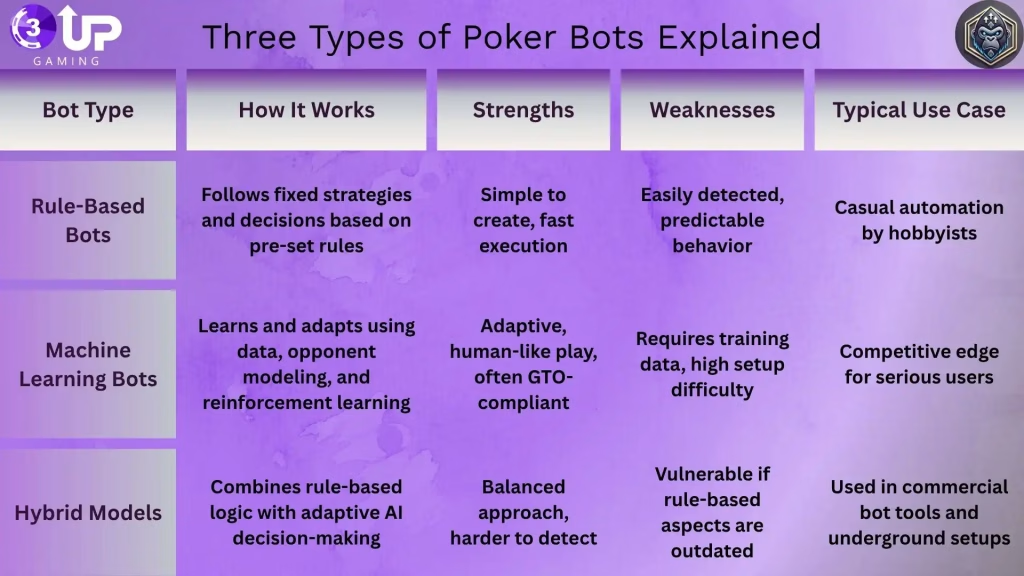
Each seasoned bot poses a different danger to fair play more broadly. However, rule based bots might appear harmless but are also able to cause havoc in regular games.
Machine learning bots, and hybrid models are even worse especially as they get used without the general public sight in the world of high-stakes poker. As the divide between allowed and unallowed software constantly gets thinner, it’d be wise for players and sites to stay aware of and respect the given guidelines.
Want smarter decisions? Bitcoin Poker UI Wins Big in 2025
Walk on the line by: How to Buy Real Money Poker Apps Safely
The Line Between Legal Tools and Illegal Bots
We have seen poker bots go from being rule-following kids to AI-driven poker decision engines- in no time. While preliminary versions were all about set actions (raise big, check weak), the bots these days make use of machine learning and game theory to imitate and optimally outperform humans.
They aren’t just executing strategies, they are framing them from the ground up. As the bots continue to get smarter and keep integrating into poker games, the poker websites will have to navigate a challenging road ahead of them and in some point of the future can make players whether they are seasoned or just beginners adapt to the change.
Allowed Instruments
There is a wide range of software available to internet poker players that help them with decision-making during their games. But the tools can only be used when a person is not playing a game in real-time. These tools comprise hand history analyzers, heads-up displays (HUDs), which provide statistical data taken from past hands, and equity calculators that test the power of hands in different cases.
These assists are the widespread players’ choice as they in-duce no direct inhibition of the game process. Moreover, they are rather helpful in influencing the positive long term of the game in the player’s minds with outliers more quickly and accurately.
Hand history analyzers, HUDs and equity calculators are the perfect example of tools that poker sites allow. These are tools that do not need to be actively used in real-time by the player; they store data and provide players with summaries upon request, as a result, do not require that the user be able to “think” in the process of the game.
In other words, they are facilitators that improve learning and execution situations that occur long after stuffing the ol’ bandit.
The Courage to Cross the Line
Once a technology makes critical decisions for the player while she/he is playing the game, it is quickly referred to as a bot or is banned. This category also includes assistance programs (e.g., RTA) that deal with poker decisions in real-time and AI (Artificial Intelligence) bots that can play the game autonomously.
Such applications undermine the capability aspect of poker games by substituting player intuition for the algorithms’ exactness. The issue of cheating at online poker has become more acute as the users of these programs have recently started using the best solvers to the fullest extent, e.g., by running them along with the game, or trying to wriggle out of using RTA as a HUD.
Consequently, the dueling parties are all the time updating the rules and robots to create a code and cheating software vernacular that will help them solve and catch only the most honest trickery and highest-brow crimes against this human’s game.
One of the most critical challenges for players is to comprehend the limits of the cheating zone as this way they can prevent themselves from unintentionally becoming cheaters and, in addition, monitor the fairness of others.
Impact of Bots on Fair Play and Competition

Player Trust Issues
Poker bots are scumbags that only serve to erode trust between players and platforms or sites. When players think they are playing against a computer, it will turn off casual players. The mere suggestion of bots on a platform is bad for business.
Game Integrity
Bots undermine poker’s most basic principle: that it’s a game of skill. Because of this and the lack of emotion in bots, ticketing systems score better against an incoming attack than regular players.
This skews results, warps the rankings which are supposed to guide our winnings. To keep the platform fair they have always been working to find and remove unfair advantages so more hands are a test of human skill than code.
Read more about: Unique Traits to Make Poker NFT Characters Stand Out
Capture what you need with: Bitcoin Poker Sites to Trust in 2025
Detection Techniques Used by Poker Platforms
In order to ensure the integrity of the games and retain player confidence, as such, online poker sites employ a number of tools to identify and combat bots. These systems operate in the background, examining gameplay and user activity to flag nefariousness.
Here’s a rundown of the three types of detection, what they catch, and how well they do it.
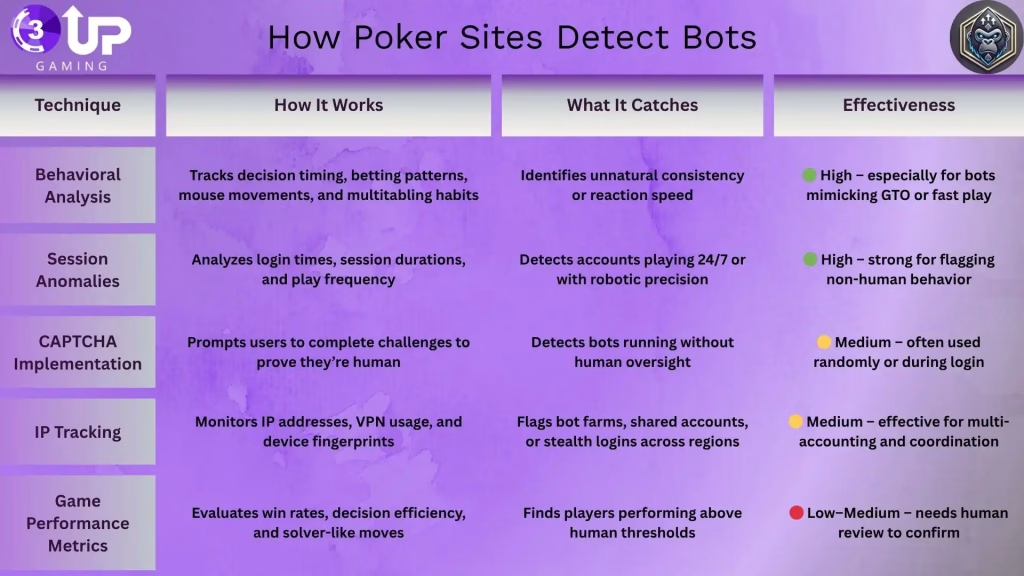
But the bots are having other far-reaching impacts too, weaving thoughtful questions into the fabric of the game about fair play, skill and what it really should mean to “beat the game.”
The line between a tool and a cheat has never been thinner and as poker sites counter-balance by implementing new regulations and technologies, the online poker industry might as we know be defined by the ability to instate trust back at the virtual table.
Explore further: Your Gateway to Gaming Biz
Boost your game with: The Best White Label Poker Software Providers for 2025
The Ethics and Risks of Using Poker Bots
Ethical Considerations
Having the poker bot to play the game that winds the original ethical fundamental principle of online poker itself. This match is all about skill, psychology, trust, combat that are never locations for automatic methods.
Every so often bot is not discovering but sneaks in via the gray areas in rules but essential to dishonour the spirit of the game. By removing the emotional and psychological part of poker bluffs bots give its users an automatic unfeeling with humans.
Bot use has often been compared to cheating on an ethical level, as it is effectively tricking other players into thinking they are competing against a person.
Potential Results
Consequences of bot use in poker can be severe at both micro and macro levels. Most platforms have determined anti-bot protocols meeting a breach which will result in ban and funds forfeited. And players quite literally lose face if caught using them, especially in the public eye in gaming.
On a larger scale, the widespread adoption of bots threatens the online poker ecosystem in the long term. The player who was not taking any unsustainable system of abuse in case of new players or recreational players, frequently doesn’t come back which in the end results in reduction in player and ecology will suffer hard.
In short, the short-term gain from using a bot rarely outweighs the ethical breach and long-term risks it poses.
Sharpen your tactics with: Rent a Poker App: Flexible & Cost-Effective Solutions
Don’t miss this: Full Comparison of Top Poker Bots in 2025
Real-Time Assistance (RTA) vs. Fully Automated Bots
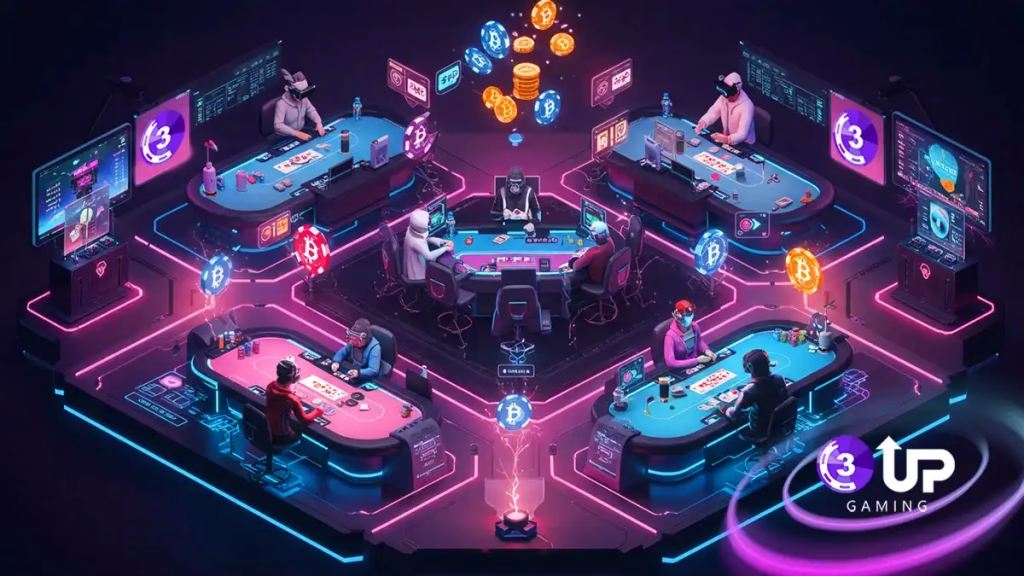
Understanding RTA
Real Time Assistance (RTA) refers to software or tools designed to help players during live play but NOT play their hands for them. As opposed to fully automated bots, RTA requires human intervention but offers far more efficient suggestions typically sourced from solvers or decision charts.
Key Features:
- User driven, it doesn’t act autonomously
- Software will assist the user real-time on optimal plays
- Outputs similar to has solvers like PioSOLVER or GTO+
- Commonly prohibited by poker rooms
Games that rely on RTA tools are just as unfair as being “coached” on hands while someone is telling you what to do.
Comparing to Full Automation
Fully Automated Bots go a step further: they play complete hands without human intervention. It impersonates clicking, reading display information, and control without manual involvement.
Variations from RTA
- Runs entirely autonomously plays from start to finish
- Player does not need to be present during the game
- Much easier to detect due to set robotic patterns
- Commonly paired with off of multi-account play
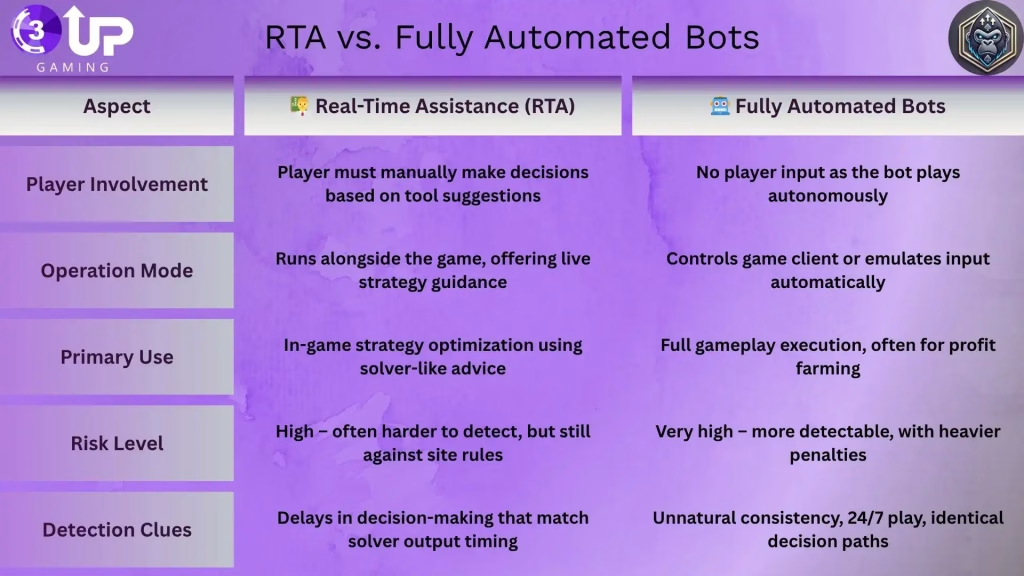
Both tool types are in violation of platform rules, yet fully automated bots are seen as a more severe threat to game ecology due to their self-sufficiency and scalability.
More on that in Risks of Using RTA Software for Professional Poker Players
Compare this with: Poker Site Rules Regarding the Use of RTA Software
How Bots Influence Casual vs. Professional Players
Casual Player Impact
For casual poker players, bots can ruin the fun in a major way. The majority of people come to online poker largely for entertainment, a form of socialisation; and lastly some competition and not knowing that they are coming in against bots. So the result often is, when they are playing bots:
- some very unlucky losses because they play perfectly
- Emotionless, pattern heavy and unnatural feeling gameplay
- a sense of pointlessness sometimes causing them to leave the platform
Just the suspicion of bots can cause trust issues with casual players and make them weary of returning to online poker.
Professional Player Adaptations
Professional players have a different beast to tame. They are better at sniffing out bots, but suffer financially when they flood the market. The pros usually:
- Study solver patterns to mitigate exploitation
- Poker on sites that are more likely to have better bot defense in place
- Lean towards formats(s) that can’t be automated, like live poker, or tournaments with flexible structures
Some pros will tweak their own strategies to take advantage of bots as they can be predictable. However, competing with machines can suck resources and create a distraction from the real objective.
In both cases though, the game longevity is at risk as a result of bots which can leave it less appealing for new players and more complex for seasoned players.
Don’t miss this: Why Do You Need Multi-Table Poker Software?
Take control with: How to Start an Online Poker Business
The Future of Bot Regulation in Online Poker
As poker bots have graduated from simple scripts to complex AI foes they have revolutionized what it means to play poker online. It has been an hour of soul searching about what it means to fairly play, what playing means even to us on a deeper psychological level. Bots suck much of the fun out of the casual player’s experience, while serving as a relentless challenge to those who make a living from poke.
Under extreme pressure to respond, online poker platforms and even gaming regulators are now in a fight to define a future where victory is not only for the best player but for those who play fair as well.
The New Bouncer Rules
While bots get more sophisticated, the evolution of what is, from platform guidelines to clearer (and more dogma backed) rules about bots continues. The big poker sites now much more clearly define what bot-like behaviour is (RTAs, data scraping tools, auto-players).
Some have even given outright banning with repercussions and public naming for the transgressor. There is a storm warning on the horizon, governments and gaming commissions are beginning to wake up to this.
Certain regulated markets (like the UK and some parts of the EU) now require operators to prove they are actively detecting bots and maintaining fair play as part of their licence commitment. This pressure is actually forcing everyone towards anti-bot standards that didn’t exist 3-4 years ago.
Fake I.D
This means putting money into AI infrastructure so the poker sites can look for non-human behaviour much more accurately. These systems are looking at HUGE data sets that take in millions of hands to identify bots that do any anti-social activity using signals of pattern, timing information and signals of collusion.
Poker networks are also testing with client-side tools that monitor for “suspicious gaming behaviour” that can spot unapproved third-party apps and will send a report back to the moderators in real-time. Dynamic CAPTCHA puzzles, randomized gaming conditions and enhanced hardware fingerprinting are also part of the bot-finding arsenal.
The battle between poker bot creators, and the sites fighting against them will go on further into the future but this time the platforms have better technology-resource to keep the playing field level.
Check out: The Best Online Poker Bots Used by Pros
As we covered in Online Poker Software Compliance Standards Explained
If you are a player your first line of defense is information. Better still understand what tools you are using, and stick to where the trustworthy communities are. On the other hand for the platform builders, the ball is squarely in your court- in essence it’s your responsibility. And at least that’s what the game deserves.
Q&As: How Poker Bots Are Changing Online Gaming
1. What exactly is a poker bot and how does it work?
A poker bot is a software program that plays poker for you. It makes decisions based on cards, betting patterns and probabilities, often using established rules or complex algorithms like AI and solvers. Some bots even mimic human behavior to avoid detection.
2. Are poker bots legal to use in online games?
No, using poker bots is strictly forbidden on almost all online poker sites. While some tools like HUDs or equity calculators are allowed outside of play, any software that makes decisions during a live hand is considered cheating and will get you banned.
3. How do online platforms detect and ban bots?
Poker sites use several detection methods: Behavioral analysis (timing, bet patterns), IP/device tracking, Session anomalies, Real-time monitoring tools, and CAPTCHAs. Once flagged, accounts are reviewed and if confirmed, banned and money taken.
4. Do bots give an unfair advantage in poker?
Yes. Bots can execute perfect mathematical strategies without emotion or fatigue, that’s why they are so dangerous in the long run. Even less advanced bots can beat casual players, creating a very uneven playing field.
5. What is the difference between RTA software and poker bots?
RTA (Real-Time Assistance) tools give you in-game advice but don’t play the hand for you. You still click and act. Poker bots on the other hand are fully automated – they make all decisions and make all moves with zero human input.

